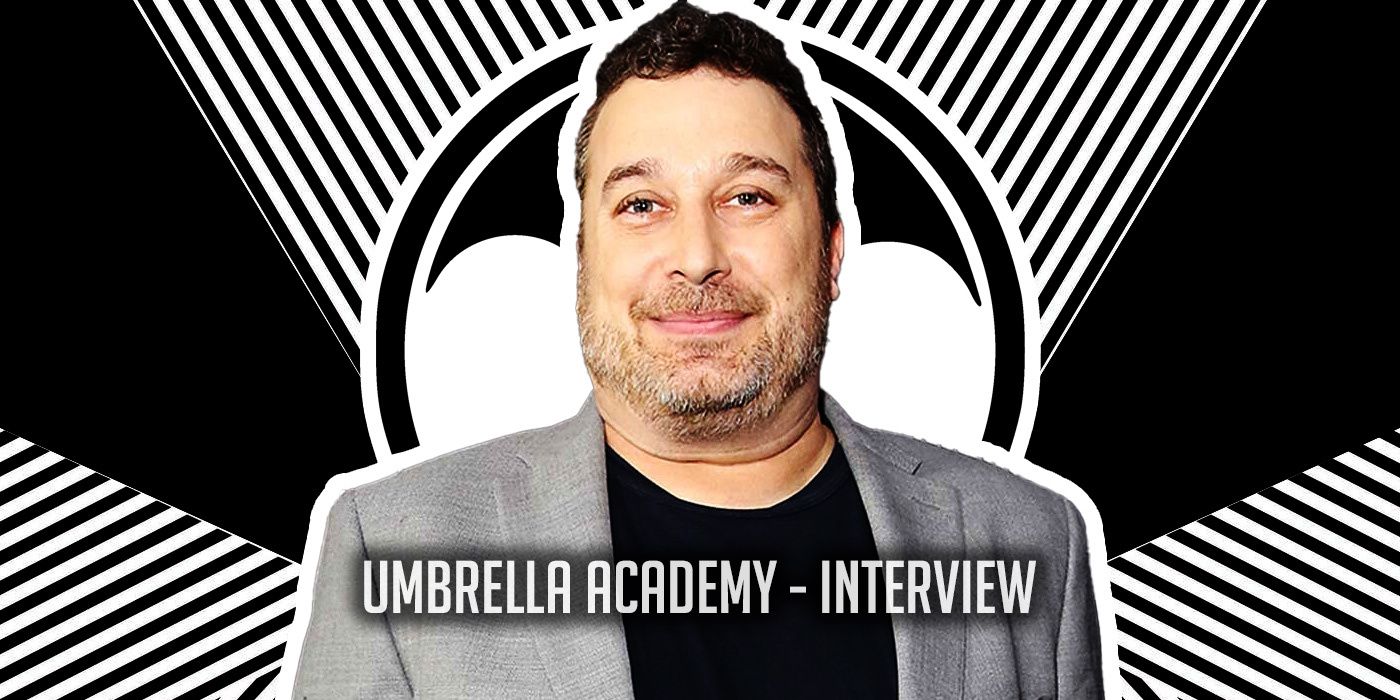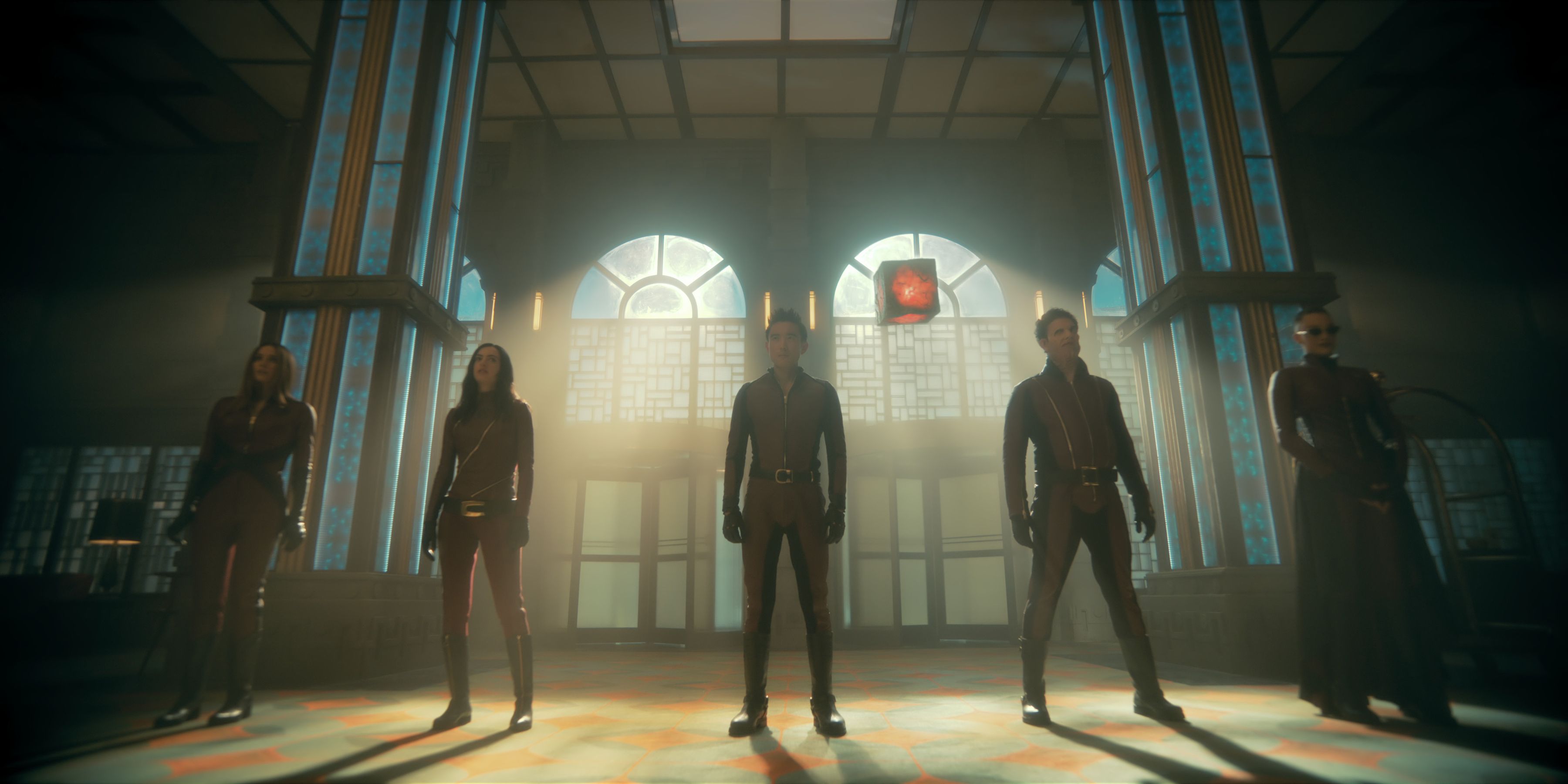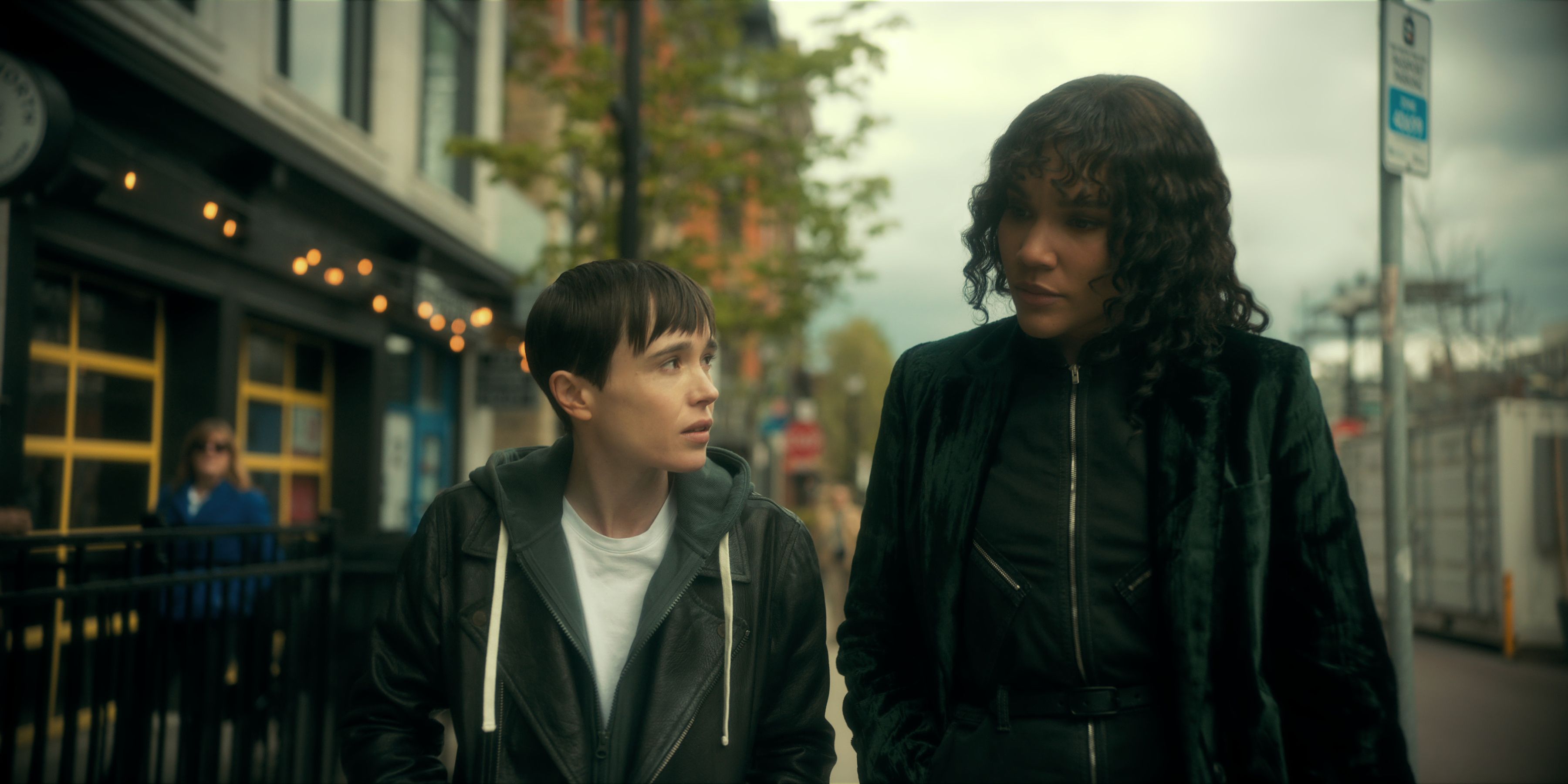Editor's note: The below interview contains major spoilers for Season 3 of The Umbrella Academy.From showrunner Steve Blackman, Netflix's The Umbrella Academy (adapted from the Dark Horse comic series by Gerard Way and Gabriel Bá) has finally returned with its third season, in which the dysfunctional family of superheroes known as the Hargreeves has returned from the past to find a present that... doesn't look the same as when they initially left it. Confronted by a new Academy known as the Sparrows that their adoptive father Sir Reginald Hargreeves (Colm Feore) has brought up and raised in their stead, the Umbrellas — consisting of Luther (Tom Hopper), Viktor (Elliot Page), Allison (Emmy Raver-Lampman), Diego (David Castañeda), Klaus (Robert Sheehan) and Five (Aidan Gallagher) — must work together to try and figure out what went wrong, as a growing paradox known as the Kugelblitz threatens to destroy this existence altogether. The third season also stars Justin H. Min as the Sparrow version of Ben, as well as Ritu Arya as Lila, Callum Keith Rennie, Genesis Rodriguez, Britne Oldford, Justin Cornwell, Jake Epstein, Cazzie David, Javon Walton, and Julian Richings.
Ahead of Season 3's premiere, Collider had the opportunity to speak with Blackman about some of the most pivotal moments that play out over the course of the story. Over the course of the interview, which you can read below, Blackman discussed having to rewrite the season to account for the pandemic, how Viktor's storyline was informed by Page's own personal journey, and how the Umbrellas and Sparrows are mirror opposites of one another. He also spoke about what that scene between Allison and Luther signifies, where the Umbrellas end up by the end of the season, which Ben that is in the post-credits scene, and more.
Collider: This season feels very intimate, not just in terms of the plot but the scope in terms of where we see these characters. Was that by design or the circumstances of filming, maybe real-world conditions limiting how much you were able to do on location?
STEVE BLACKMAN: Great observation. The reality is I had to rewrite the show at a certain point because of limitations in shooting in Toronto during the height of COVID. As we were making much more progress here in the States getting vaccinations, Canada was a good six to 10 months behind. While we were shooting the show, we were in the height of Toronto's very, very limiting rules, right down to the number of actors that could be on set at the same time. Our location was nearly impossible to do, [it] was almost impossible to do a show on location. It ended up [that] I had to bring more into our interior location, so the hotel became a set we used more often.
I'm still very proud of the story told, but yes, we wanted to go up more. There were certain things we had to change because it just became impossible. It was in a very tough year for shooting. The crew and cast went above and beyond given the challenges. Even the dance at the beginning, we did via Zoom. They did choreography through Zoom in lockdown in a quarantine room for two or three weeks. Every bit of this year was a challenge. We literally finished just as vaccinations were coming into Toronto.
In spite of that, you really get a sense of place with the hotel especially, because those sets look great.
BLACKMAN: Oh, thank you for saying that. Carey Meyer, our production designer... it is a monster set. What you're seeing is no VFX extension, it is a gigantic hotel set with hallways. Everything you saw. Part of that, obviously, was planning, because with COVID we said "Let's build as much as we can." But it's really a beautiful bit of work that Carey did, and it was a lot of fun because while you're shooting there, after a while you forgot you weren't in a real hotel.
Another big part of this season is the Sparrows, complete with a different Ben. In many ways, they're what the Umbrellas could have become but didn't, though even they have their shortcomings where the Umbrellas have learned to rely on each other differently. What did you want to emphasize in juxtaposing those two teams and then eventually forcing them to come together?
BLACKMAN: The way I saw it in my mind [is] the Umbrellas are families that don't know how to be superheroes and the Sparrows are superheroes that don't know how to be a family, so they really come from quite a different place. The Umbrellas broke up when they were young. They never quite made it as superheroes. They've come back together, and they're trying to become a family and in some ways over three seasons, they've done that. The Sparrows, on the other hand, have excelled and [are] at the top of their game as superheroes, but the family dynamics have completely broken down.
I did want to juxtapose those two different ideas of which is really better? Ultimately, it's better to have family than to be the best superheroes in town. That's the message of the story. But you see that in some weird ways, the Sparrows are craving family desperately because they don't really have that in each other. They're just a well-oiled machine, like soldiers, but not close and not understanding anymore of each other. They're the perfected group, but clearly, it's not right. So it's one to wonder if the Umbrellas would've become like the Sparrows if they'd stayed together, or maybe becoming apart and appreciating each other more is what made them now come to love each other, which they do now. They're actually very accepting of each other.
Speaking of acceptance, I definitely wanted to talk to you about Viktor's storyline this season, bringing that narrative in. I was wondering about the timing of it and what informed making Season 3 the time to do that. How much did Elliot's personal journey inform how and when that played out on the show?
BLACKMAN: Elliot phoned me one day and just let me know that he was transitioning. I was very, very happy for him, and I'm a proud ally of the LGBTQ community, and I'm fortunate to work on a show that is focused on inclusion and compelling storytelling. So when Elliot told me, it was not in the story at that point. Elliot was very kind and said to me, "You do what you want to do. I'm not forcing you to do anything." I decided it was the right thing to do, to do the transition in the storyline. I had a lot of talks with Elliot. I worked with a trans writer named Thomas McBee and I also worked with Nick Adams of GLAAD, because it was so important for me and for all of us to tell an authentic and sensitive storyline. I couldn't have done it without the team, including Elliot. It was an incredibly collaborative process to do it together. Like many people, I was unfamiliar with what it means to be transgender, and I learned so much filming this past season, still have a lot to learn, obviously, but I'm excited for fans to see Viktor's story unfold during Season 3 because I think it's important to see a positive story.
There are a lot of character duos who get solo time together this season, and maybe the most surprising, but also hilarious, case to me was Klaus and Reginald. What prompted the writers to throw those two together?
BLACKMAN: Yeah, that didn't come about because of COVID. That was always in the storyline. Hargreeves is a very complex character. It is the same Hargreeves from both timelines. The difference is, in Season 3, he just didn't pick that set of kids. He picked a different set of kids. He's a father who doesn't know them because he didn't adopt them, but he also is the same person, and we wanted to explore the dynamics of whether he cared to connect with any of them truly emotionally. Would Hargreeves, one on one, be a bit more vulnerable in this season? Because Marcus and the team have taken control over the house, the finances, and they've relegated poor Reggie to a secondary, sedated position. Was he more vulnerable, and could one of the kids connect with him? And Klaus is all things zany and over-the-top and speaks his mind, but we thought there is always a side of every kid who wants to know their parents and connect with their parents as we all do. We just thought it was wonderful to see Klaus extend that emotional bridge to Hargreeves, and we wanted to see what his reaction was.
It is a genuine pairing. Even though Hargreeves uses Klaus ultimately, in the end, I do think they enjoyed their time together. It's strange, he did help him learn about his power in the most cruel way possible playing ball in the street. But I think that's what's so fun about the two of them. In real life, they're quite close together. They're friends. There's a wonderful thing they have together, magic when they come together on stage, the two of them.
Allison seems to really be going through it this season. We see a lot of darker sides to her that emerge, but it's darkness that arises from pain and loss. The scene with Luther feels like a crescendo of all her worst impulses really coming together in that one very regrettable moment for both of them. Why did it feel narratively important to include that moment between them, and what does it impact about their relationship moving forward?
BLACKMAN: At the start, I just want to address one thing. With the way I saw Allison this year, it was that she's suffering from PTSD from her time in the Jim Crow South of 1963. She's ripped apart from her daughter in Season 2, and now she's ripped apart from her husband Ray, and she's coming apart. She's going down a very dark emotional place because of the pain of losing two people she loves. She's [also] traumatized by her experience with the racial intolerance that she experienced in Season 2. To me, it felt like a natural place to go. I talked to Emmy a lot about it, and we discussed finding this. How do you express that pain, and where does she go with that pain of loss?
The thing with Luther... that scene was a very interesting scene. It was a hard scene to write. The truth about that scene is it's not because she really wants. I mean, Luther and Allison was always puppy love. They never really were together. We had a scene in Season 1 in an episode called "The Day That Wasn't," where it's the only time they feel for a moment like they could be together. But really, Allison grew out of the puppy love long ago, even though Luther didn't. Now, Luther, this year, is growing up, and he's having a real relationship. But Luther's always been that person that no matter what Allison can go to, the one reliable human being, the anchor in her life no matter what. Now, in that moment where she bottoms out, she feels rejected when he's not going to just be there for her completely, and it's very hard not to fall back on that power she has to manipulate the mind to get what she wants. That's the thing she worked away from in Season 1, where we find out that she's used that her whole life to fall in love with her first husband, so she regresses to just show Luther, "Well, I can do whatever I want." It was a very interesting scene to play, but obviously, she's regretful of it. It hurts them both, because that's not what she really wants. She just wants someone to care for her. But we thought it was really interesting to do it with her power and see how far she would take it.
The end of this season definitely leaves our cast in a very interesting place. Is there any hint you can give about Allison specifically and where she is? She has Claire and Ray with her, but is it even real?
BLACKMAN: I have a pretty good idea of Season 4. If we're lucky enough to be picked up, I know where we're going. Clearly, there will be a challenge for our Umbrellas to deal with a world where they have no powers. I think it's safe to say they'll figure out a way to get them back. But Allison is not in a different timeline, she's in the same timeline. In fact, Ray and Claire do exist in this timeline now. That was the dark deal she made with Hargreeves, to help Hargreeves bring the family together. This is what she got. She got a man who existed in the 1963 timeline, Claire existed in a different timeline, [and] they are now merged into this timeline. So she got the best of both worlds, but it had a price which is to screw her whole family. Ultimately, she stops Hargreeves, but without giving too much away, stopping Hargreeves from finishing what he was doing was probably not the best move. The universe has been reset, but I'm not sure we could say it's being reset the right way.
With the reset button being hit on the universe and everything, [in] that post-credit scene, can you confirm which Ben that is on the train?
BLACKMAN: All I can see say to you is it is the Ben we know from this season. The where and why and how of it all, you'll have to wait until next season to find out how it all connects. It's not a different timeline Ben. It's the Ben we know from Season 3, but how that works and why we're seeing him will be a Season 4 reveal.
The Umbrella Academy Season 3 is now streaming on Netflix.



